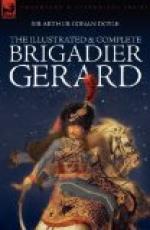’You must know, then, that my father was the well-known banker, Christophe Duroc, who was murdered by the people during the September massacres. As you are aware, the mob took possession of the prisons, chose three so-called judges to pass sentence upon the unhappy aristocrats, and then tore them to pieces when they were passed out into the street. My father had been a benefactor of the poor all his life. There were many to plead for him. He had the fever, too, and was carried in, half-dead, upon a blanket. Two of the judges were in favour of acquitting him; the third, a young Jacobin, whose huge body and brutal mind had made him a leader among these wretches, dragged him, with his own hands, from the litter, kicked him again and again with his heavy boots, and hurled him out of the door, where in an instant he was torn limb from limb under circumstances which are too horrible for me to describe. This, as you perceive, was murder, even under their own unlawful laws, for two of their own judges had pronounced in my father’s favour.
’Well, when the days of order came back again, my elder brother began to make inquiries about this man. I was only a child then, but it was a family matter, and it was discussed in my presence. The fellow’s name was Carabin. He was one of Sansterre’s Guard, and a noted duellist. A foreign lady named the Baroness Straubenthal having been dragged before the Jacobins, he had gained her liberty for her on the promise that she with her money and estates should be his. He had married her, taken her name and title, and escaped out of France at the time of the fall of Robespierre. What had become of him we had no means of learning.
’You will think, doubtless, that it would be easy for us to find him, since we had both his name and his title. You must remember, however, that the Revolution left us without money, and that without money such a search is very difficult. Then came the Empire, and it became more difficult still, for, as you are aware, the Emperor considered that the 18th Brumaire brought all accounts to a settlement, and that on that day a veil had been drawn across the past. None the less, we kept our own family story and our own family plans.
’My brother joined the army, and passed with it through all Southern Europe, asking everywhere for the Baron Straubenthal. Last October he was killed at Jena, with his mission still unfulfilled. Then it became my turn, and I have the good fortune to hear of the very man of whom I am in search at one of the first Polish villages which I have to visit, and within a fortnight of joining my regiment. And then, to make the matter even better, I find myself in the company of one whose name is never mentioned throughout the army save in connection with some daring and generous deed.’
This was all very well, and I listened to it with the greatest interest, but I was none the clearer as to what young Duroc wished me to do.




